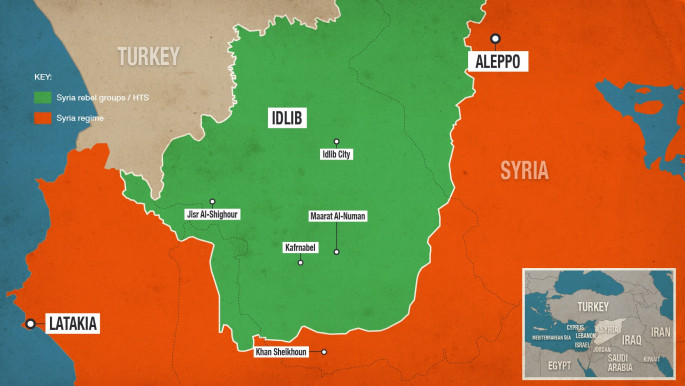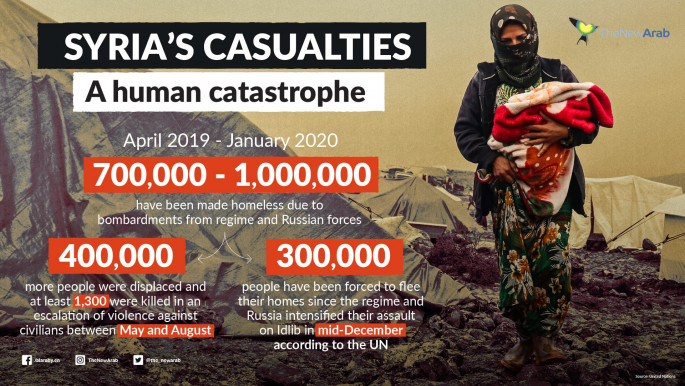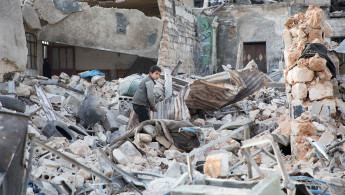Follow us on Twitter and Instagram to stay connected
Scores of Syrian regime and rebel combatants killed as fighting ‘buries’ ceasefire
Dozens of fighters and civilians were killed in Syria's Idlib province as the government pressed a deadly offensive on Thursday towards the deserted city of Maarat al-Numan in the south of the province
The latest violence, which followed bloody regime and Russian airstrikes that left 19 civilians dead on Wednesday, buried a ceasefire announced by Russia and Turkey last week that never really took hold.
"Clashes broke out around midnight on Wednesday south of the city of Maaret al-Numan, together with heavy bombardment despite the Russian-Turkish truce," Rami Abdel Rahman, head of the Syrian Observatory for Human Rights (SOHR), said.
According to SOHR, the fighting raged in areas south of Maaret al-Numan, the key target of the Syrian government's latest military offensive. The city was home to 110,000 people before December but its inhabitants have now left as a result of brutal regime and Russian airstrikes.
Abdel Rahman said that regime forces were now only seven kilometres from Maarat al-Numan, which was once a stronghold of the pro-democracy protests which began Syria’s uprising against Bashar al-Assad’s rule. Protests are still held in Idlib province despite the regime’s airstrikes.
Read more: ‘Humanity is dying’ - Syrians feel abandoned by the world
At least 26 anti-regime fighters were killed, most of them members of Hayat Tahrir al-Sham, a group that includes fighters from the former Al-Qaeda affiliate in Syria.
SOHR said that 29 regime troops and allied militia were also killed in the fighting.
The Syrian regime news agency SANA later reported deadly rocket fire on a residential area of the city of Aleppo, which is under regime control.
"Six civilians were killed and 15 others injured in a rocket attack by terrorist groups," it said, using the regime description for all opposition forces.
Rebel groups are present west of the city, and the regime regularly accuses them of launching rocket attacks.
‘People are afraid, the markets are empty’
In Idlib city, local people said they had no trust left in the ceasefire. Russia has announced ceasefires before, some of them also guaranteed by rebel backer Turkey and regime ally Iran, only to break them later arbitrarily.
"We live here without knowing if there is really a truce or if it's just in the media. On the ground, there is no truce. People are afraid, the markets are empty," Sari Bitar, a 32-year-old engineer living in Idlib city told AFP on Thursday.
"Just like everybody else, I can't stay in an area on which the regime, Russian forces and Iranian militia will advance," he said.
"The only problem is that there is nowhere to go," Bitar said. "Syria is now limited to this geographical area, which is getting smaller day by day."
Assad has repeatedly pledged to capture rebel-held Idlib, where 3.5 million people live, many of them forcibly displaced from other parts of Syria.
Idlib province is a dead end for people displaced from other formerly rebel-held parts of the country that regime forces have captured.It has come under ferocious bombardment in recent weeks.
New waves of displaced people
The United Nations' humanitarian coordination agency OCHA said that since December 1 alone, almost 350,000 people had fled their homes, mainly heading northwards from southern Idlib, which has borne the brunt of the air strikes.
"An additional 650,000 people, the majority of them women and children, could be forced to flee their homes if the violence continues," the International Rescue Committee warned in a statement.
The European Union expressed deep concern over the collapse of the fledgling Idlib ceasefire and also warned that further violence could trigger an unprecedented wave of refugees and displaced.
The winter conditions, with sub-zero temperatures interspersed by heavy rain, are putting thousands of lives at risk.
A UN resolution on cross-border aid to Syria which was negotiated at the last minute after Russia threatened to veto it, maintained two key entry points for UN humanitarian aid into Idlib, where the number of people in extreme need keeps growing.





 Follow the Middle East's top stories in English at The New Arab on Google News
Follow the Middle East's top stories in English at The New Arab on Google News
![Both Hamas and the Palestinian Authority welcomed the ICC arrest warrants [Getty]](/sites/default/files/styles/image_330x185/public/2024-11/GettyImages-2178351173.jpg?h=199d8c1f&itok=TV858iVg)

